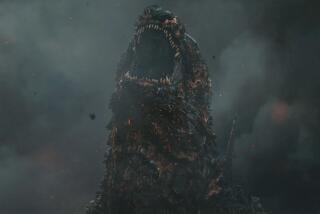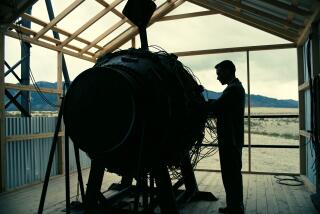TV REVIEWS : Superpowers in the Nuclear Age : ‘Nippon’ Details Japan’s Recovery From Ravages of War
- Share via
Many have tried to tell the tale of Japan’s rise from the rubble of war to become a global economic giant. But “Nippon: Japan Since 1945,” an eight-part documentary that starts Sunday at 5 and 9 p.m. and repeats next Saturday at 9 a.m. on the Arts & Entertainment Network, does so masterfully. (The series continues at the same times for the next seven weeks.)
The first segment, “Out of the Firestorm,” traces the unconditional surrender of Japan after World War II, Emperor Hirohito’s renunciation of divine status and U.S.-led efforts to remold the nation into a peace-loving, democratic nation. The second segment, “Catching Up,” examines the roots of Japan’s stunning economic turnabout.
At a time when troubled U.S.-Japan relations are too often viewed simplistically through a contemporary lens, the rich historical perspective is invaluable.
Co-produced by the British Broadcasting Corp., the fast-moving segments combine broad historical sweep with fine, telling detail: Emperor Hirohito’s hand trembling in fear as he met Gen. Douglas MacArthur for the first time, Japanese schoolchildren obediently inking black X’s over textbook passages construed as militaristic by Occupation authorities. Such moments are created by fascinating news footage of the era and interviews with a rich and varied cast of characters.
We meet, for instance, a Japanese Army general recalling the surrender, a farmer remembering the land reform, a film director explaining the Occupation censorship, a Mitsui Co. manager describing the tears of his colleagues when the mighty zaibatsu (conglomerate) was ordered to break up.
In “Catching Up,” viewers learn that the Americans abandoned harsh measures against Japan--busting up the conglomerates, forcing it to dismantle and ship out 1,000 factories as war reparations--amid the growing power of the Chinese Communists.
Instead, the Truman Administration made Japan’s economic recovery a top strategic priority for the United States. The Korean War gave Japanese industry its first big chance to recover as it supplied the American troops. Other seeds were central bureaucratic planning--the targeting of shipbuilding, steel and petrochemical industries to nurture--and individual innovation, such as Masaru Ibuka’s invention of the first transistor radio.
Edwards Deming, whose “just-in-time” manufacturing system was perfected by Toyota, had predicted that Japan would bounce back in five years. He was wrong. It took four. Asia consultant James Abegglan’s 1948 book, “The Japanese Factory,” concluded the Japanese system of job-for-life and seniority promotions could never work. He was wrong too.
But if Westerners underestimated Japan through sheer lack of understanding at the time, “Nippon,” does a commendable job in filling the information gap. With the current tension over what many Westerners view as Japan’s inadequate role in the Persian Gulf crisis, the documentary comes at an especially opportune time.
More to Read
The complete guide to home viewing
Get Screen Gab for everything about the TV shows and streaming movies everyone’s talking about.
You may occasionally receive promotional content from the Los Angeles Times.







